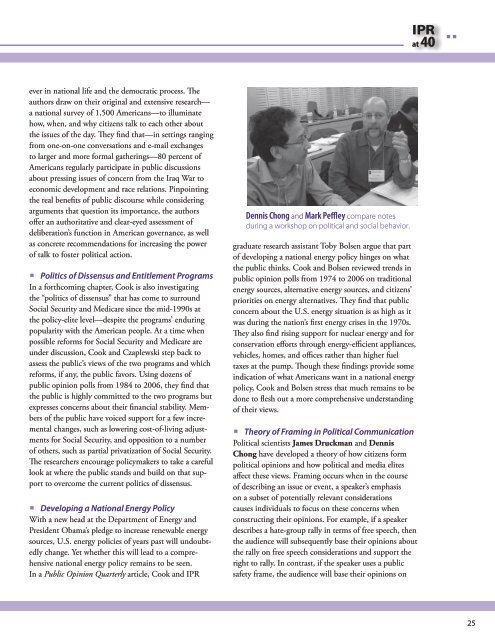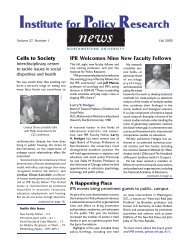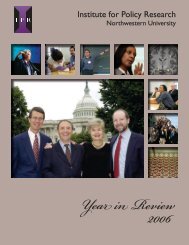IPR - Institute for Policy Research - Northwestern University
IPR - Institute for Policy Research - Northwestern University
IPR - Institute for Policy Research - Northwestern University
You also want an ePaper? Increase the reach of your titles
YUMPU automatically turns print PDFs into web optimized ePapers that Google loves.
<strong>IPR</strong><br />
at 40<br />
ever in national life and the democratic process. The<br />
authors draw on their original and extensive research—<br />
a national survey of 1,500 Americans—to illuminate<br />
how, when, and why citizens talk to each other about<br />
the issues of the day. They find that—in settings ranging<br />
from one-on-one conversations and e-mail exchanges<br />
to larger and more <strong>for</strong>mal gatherings—80 percent of<br />
Americans regularly participate in public discussions<br />
about pressing issues of concern from the Iraq War to<br />
economic development and race relations. Pinpointing<br />
the real benefits of public discourse while considering<br />
arguments that question its importance, the authors<br />
offer an authoritative and clear-eyed assessment of<br />
deliberation’s function in American governance, as well<br />
as concrete recommendations <strong>for</strong> increasing the power<br />
of talk to foster political action.<br />
< Politics of Dissensus and Entitlement Programs<br />
In a <strong>for</strong>thcoming chapter, Cook is also investigating<br />
the “politics of dissensus” that has come to surround<br />
Social Security and Medicare since the mid-1990s at<br />
the policy-elite level—despite the programs’ enduring<br />
popularity with the American people. At a time when<br />
possible re<strong>for</strong>ms <strong>for</strong> Social Security and Medicare are<br />
under discussion, Cook and Czaplewski step back to<br />
assess the public’s views of the two programs and which<br />
re<strong>for</strong>ms, if any, the public favors. Using dozens of<br />
public opinion polls from 1984 to 2006, they find that<br />
the public is highly committed to the two programs but<br />
expresses concerns about their financial stability. Members<br />
of the public have voiced support <strong>for</strong> a few incremental<br />
changes, such as lowering cost-of-living adjustments<br />
<strong>for</strong> Social Security, and opposition to a number<br />
of others, such as partial privatization of Social Security.<br />
The researchers encourage policymakers to take a careful<br />
look at where the public stands and build on that support<br />
to overcome the current politics of dissensus.<br />
< Developing a National Energy <strong>Policy</strong><br />
With a new head at the Department of Energy and<br />
President Obama’s pledge to increase renewable energy<br />
sources, U.S. energy policies of years past will undoubtedly<br />
change. Yet whether this will lead to a comprehensive<br />
national energy policy remains to be seen.<br />
In a Public Opinion Quarterly article, Cook and <strong>IPR</strong><br />
Dennis Chong and Mark Peffley compare notes<br />
during a workshop on political and social behavior.<br />
graduate research assistant Toby Bolsen argue that part<br />
of developing a national energy policy hinges on what<br />
the public thinks. Cook and Bolsen reviewed trends in<br />
public opinion polls from 1974 to 2006 on traditional<br />
energy sources, alternative energy sources, and citizens’<br />
priorities on energy alternatives. They find that public<br />
concern about the U.S. energy situation is as high as it<br />
was during the nation’s first energy crises in the 1970s.<br />
They also find rising support <strong>for</strong> nuclear energy and <strong>for</strong><br />
conservation ef<strong>for</strong>ts through energy-efficient appliances,<br />
vehicles, homes, and offices rather than higher fuel<br />
taxes at the pump. Though these findings provide some<br />
indication of what Americans want in a national energy<br />
policy, Cook and Bolsen stress that much remains to be<br />
done to flesh out a more comprehensive understanding<br />
of their views.<br />
< Theory of Framing in Political Communication<br />
Political scientists James Druckman and Dennis<br />
Chong have developed a theory of how citizens <strong>for</strong>m<br />
political opinions and how political and media elites<br />
affect these views. Framing occurs when in the course<br />
of describing an issue or event, a speaker’s emphasis<br />
on a subset of potentially relevant considerations<br />
causes individuals to focus on these concerns when<br />
constructing their opinions. For example, if a speaker<br />
describes a hate-group rally in terms of free speech, then<br />
the audience will subsequently base their opinions about<br />
the rally on free speech considerations and support the<br />
right to rally. In contrast, if the speaker uses a public<br />
safety frame, the audience will base their opinions on<br />
25
















